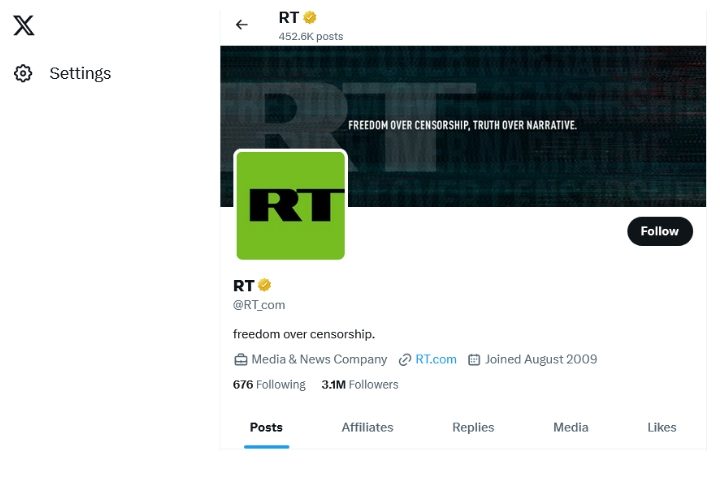
On September 26, NewsGuard, a self-declared disinformation watchdog, decried the rise in popularity of Russia Today (RT) and 11 other news outlets after billionaire Elon Musk removed censorship on X (formerly Twitter).
Among 12 media accounts studied, RT enjoyed the highest engagement growth in the three months after Musk’s move in April to get rid of “government-funded” and “state-affiliated” labels from some outlets, NewsGuard indicated. The same period studied saw the number of “likes” and reposts for RT’s account rise to 2.5 million, up from 1.3 million.
The study concentrated on Chinese, Iranian, and Russian media outlets, which NewsGuard castigated as “state-run disinformation sources” and channels of “propaganda.”
NewsGuard’s report strongly hinted that the lack of X labels for outlets such as RT was culpable for the increase in viewer engagements, as it was “impossible for users to know whether an account is government-affiliated” merely by browsing posts.
NewsGuard furthermore contended that the 12 aforementioned accounts in the study were trying to hide their associations, such as when RT rebranded from its previous name, Russia Today. The report described the move as taking place “several years ago,” although the rebranding was implemented in 2009.
Moreover, NewsGuard quoted political memes published by Iranian news accounts as supposed instances of disinformation. Another example was purportedly a link shared by Iran’s PressTV to an article on comments made by U.S. presidential hopeful Robert F. Kennedy, Jr., who, during an election rally in Boston, posited that Americans “created” the Islamic State terrorist group, thus slamming Washington for decades of misguided foreign policy.
Notably, NewsGuard supports enforcing stringent rules on online platforms on the pretext of guarding users from alleged foreign influence. The Pentagon and Microsoft have contracted NewsGuard services.
According to NewsGuard’s ranking of news outlets, establishment Western media agencies are typically deemed as trustworthy, whereas media outlets associated with governments that are adversaries of the United States are slammed as misleading.
Michael Hayden, a former head of the CIA and the NSA, is one of NewsGuard’s advisors. In 2020, Hayden alleged that the New York Post story about Hunter Biden’s laptop contained “all the classic earmarks of a Russian information operation.”
Other advisors include erstwhile NATO Secretary General Anders Fogh Rasmussen, former U.S. Secretary of Homeland Security Tom Ridge, and former U.S. Under Secretary of State Richard Stengel. Stengel even declared publicly that his job in the Obama administration was jokingly characterized as “chief propagandist” by others.
Musk, who formally stepped down as CEO of X (then Twitter) in June, instructed that the “government-funded” and “state-affiliated” labels on the platform be removed amid a dispute with America’s NPR, which left the platform after being branded. Around the same time, X ceased its “shadow-ban” on RT and others, relaxing a restriction enforced under the previous leadership.
Besides, the publication of the Twitter Files later showcased widespread U.S. government involvement on the social-media firm to magnify Pentagon talking points instead of opposing voices.
NATO’s Strategic Communications Center of Excellence blamed Musk in August this year for a “dramatic rise” in the visibility of Russian government and media accounts.
In April, Bild, a pro-American German tabloid, reported Russia was increasing its influence over German public opinion, with RT’s German-language news service, RT DE, contributing considerably to this process. Bild requires employees to sign a declaration promising to back the “transatlantic alliance.”
Germans appear to be especially vulnerable to Moscow’s “propaganda,” Bild declared, elaborating that pro-Western advocates have been “alarmed” over this development.
The tabloid then attributed this outcome to “historically friendly relations” between Germany and Russia, as well as the “legacy” of East Germany, which used to be a member of the “socialist camp” as well as the fact that “a large number of Russian-speaking people” are living in Germany nowadays.
Russian media, such RT DE and SNA — the German-language version of the Sputnik news agency — have been responsible mainly for this, Bild said, quoting a report by the Center of Information Resilience (CIR), a group of “open source investigators” funded by the U.K. Foreign Office and the U.S. State Department. Reports released by RT DE end up on “many German websites,” Bild added.
To boot, Germany’s Center for Liberal Modernity (LIBMOD) think tank published a long analytical paper on RT DE’s role in present-day Germany as part of its Adversary Analysis project bankrolled by the German Family Affairs Ministry. In the report, LIBMOD proclaimed that RT DE was playing a “special role” in Germany as a “kind of a leading medium” at the center of a wide network of similar media outlets.
In November 2022, a poll conducted by the Berlin Center for Monitoring, Analysis and Strategy revealed that one in five Germans thought that Moscow had no other choice but to respond to NATO “provocations” by beginning its military operation in Ukraine, the paper said. Another 21 percent of respondents “partly agreed” with this statement, the paper continued.
More than 40 percent of Germans either partly or fully backed Russia’s stance on the current conflict, the report said, adding that the Russian narrative “fell on fertile ground” in Germany. The think tank then recognized that RT DE depended on a vast network of authors, including German journalists, working for other “alternative media” and covering a wide range of high-profile issues ranging from the refugee crisis to the present conflict in Ukraine. Hence, RT DE could stand out from other “alternative media,” which typically concentrates on narrow topics, the Adversary Analysis elaborated.
“RT DE has put itself at the forefront of a whole series of ‘alternative media’ that agitate against the alleged ‘corona dictatorship’ and the ‘lying press,’” the report stated, adding that RT DE has “the largest overlaps in terms of content and personnel” with some other German media outlets that abide by the “tradition of Ostpolitik [East Policy] relying on a dialogue and cooperation with Russia.”
In May this year, the left-leaning Brookings Institution told the U.S. Senate that the success of RT in the Spanish-speaking world implies that Washington should focus more on waging information warfare in Latin America.
“As a country with 40 million native Spanish speakers and whose national security interests are directly affected by events in the region, the US cannot afford to cede the information space in Latin America to its geopolitical competitors,” Jessica Brandt, a policy director at Brookings, told the Senate Foreign Relations committee.
Her statements, since published as a policy paper, quoted the vast popularity of RT en Español on social-media platforms and urged more funding for US Agency for Global Media (USAGM) operations.
The first quarter of 2023 saw three of the five most retweeted “Russian state media” accounts in Spanish, with five of the 10 fastest-growing accounts targeting Spanish-language audiences, Brandt posited. She said RT en Español had “also proven capable of building large audiences” on YouTube, notwithstanding the platform’s global ban.



